Human rights news from the IBA - December 2015/January 2016
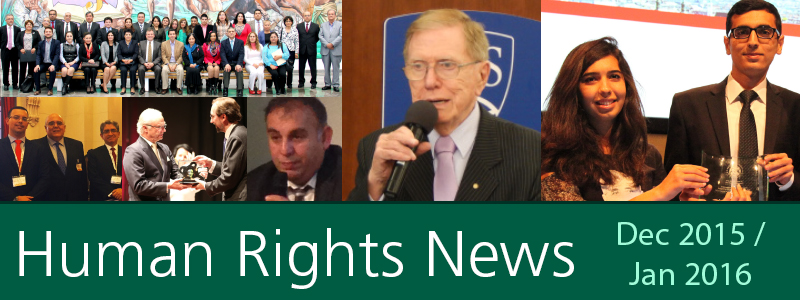
Myanmar: historic elections but ‘many questions need to be resolved’
Abby Seiff, Yangon
As dusk settled over Yangon on the evening of Sunday 8 November, thousands thronged towards the National League for Democracy headquarters. For hours, the supporters stood outside, their cheers growing as the night wore on and the TV screens depicted win after win for the opposition.
By the morning of Friday 13, the results were official: the NLD had won by a landslide. The party of Aung San Suu Kyi had gained enough seats to select the president, a parliamentary supermajority that will permit complete control over almost all legislative aspects except constitutional amendments.
The weeks leading up to the election and days following the ballot have no precedence in Myanmar’s history. The last general election, held in 2010, was boycotted by the NLD and other major opposition parties, and considered so rigged that most voters didn’t bother to turn out. The previous election, held in 1990, saw a decisive NLD victory in spite of serious intimidation and was immediately annulled.
‘Even the media situation has changed since 2010,’ said one voter, pointing out that foreign reporters weren’t even permitted to cover the polling stations in 2010. ‘I’m hoping for the best.’
This election, by contrast, was heralded by observers as ‘free and fair’. With one notable exception, voters experienced little difficulty securing IDs and casting ballots. There were few reports of intimidation or vote buying and even in areas feared to result in mass disenfranchisement, officials came through with the necessary paperwork. At polling stations, voters began queuing at dawn, openly chatting and posing for photos.
‘To a great extent, the election was genuine, free and fair, and a far cry from the sham 2010 polls,’ says Andrea Giorgetta, Director of the Asia Desk at the International Federation for Human Rights, who was on hand to monitor the elections. ‘The military has declared that they will accept the election’s results and they seem confident they can maintain the rights and privileges guaranteed to them by the Constitution. Any attempts from the new administration to reduce the power, influence, and independence of the military are inevitably destined to alter this situation.’
The praise has been pouring in. US President Barack Obama called Myanmar President Thein Sein to congratulate him personally on the calibre of the elections, while the EU chief observer praised a ‘well-run, competitive election’. In much of Myanmar, that outcome has led to a collective exhalation of breath.
‘In 1990, I didn’t believe. This time, I’m not sure, but it may be good. I don’t 100 per cent trust [that it will work out], but maybe 70 to 80 per cent. It’s a crook government, you can write that,’ said a 60-year-old NLD supporter who asked that his name not be used because he felt the subject was still sensitive. ‘I’m very happy, but I’m not surprised. We must win.’
“ There are many questions that need to be resolved as soon as possible… the manner in which the Rohingya population is treated, and the role of the military
Hans Corell
IBAHRI Co-Chair
What that win will translate to, however, remains to be seen. While there has been every indication that Thein Sein’s ruling Union Solidarity and Development Party will be accepting of the results (Thein Sein has already issued a letter of congratulations and agreed to meetings on transition), much has to be worked out. The date for transition is yet to be set, and it is believed it will take several months before the new government is installed.
More crucially, there are numerous severe checks on the nascent NLD government – the first civilian government without military ties. Twenty-five per cent of parliamentary seats are reserved for the military, meaning they can veto constitutional amendments.
Key cabinet posts including the Defence Ministry are reserved for the military and operate outside the bounds of presidential control. Even the presidency is somewhat out of the NLD’s control: thanks to the controversial Article 59(f), Suu Kyi cannot hold the position of president as it bars those with foreign children from serving. While the NLD leader has insisted she will be ‘above the president’, it is unclear what official role she could hold.
Hans Corell, IBAHRI Co-Chair, points out that ‘there are many questions that need to be resolved as soon as possible’. ‘I am thinking in particular of the manner in which the Rohingya population is treated. And the role of the military must also be reviewed,’ he says. ‘In the Myanmar Constitution there are several references to “Defence Services personnel, nominated by the Commander-in-Chief of the Defence Services”. A closer look at those provisions leads to the conclusion that they do not belong in a constitution in a democratic society.’
Addressing human rights issues facing Myanmar will be no less pressing in coming months. Members of the ruling government have spent years stirring up anti-Muslim hatred in the hopes of securing their stronghold. While that has failed on the electoral front, it has succeeded in horrifying ways. Nearly one million Rohingya Muslims were disenfranchised in the latest vote after their citizenship was stripped from them.
Anti-Muslim riots have sent hundreds of thousands fleeing, some to relocation camps that have grown deadly after being closed off to basic medical service and supplies, others across the ocean where they have fallen victim to human traffickers.
Such anti-Muslim sentiment has made its mark during this election. The NLD refused to run any Muslim candidates amid perceived pressure, and none run by other parties appear to have secured a seat, making it Myanmar’s first parliament in history without a single Muslim lawmaker. Ahead of the election, the government grew more repressive, throwing dozens of activists behind bars. The needs of those political prisoners must be dealt with. Of course, the real elephant in the room – the true test of the new government – is the nation’s myriad ethnic armed conflicts.
To download the IBA podcast on Myanmar visit: tinyurl.com/IBAPodcasts
IBA and KBA report on human rights in North Korea
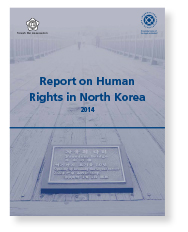 A major new report into human rights abuses in North Korea has been published by the IBA and the Korean Bar Association. The report was launched in Washington, DC by the Hon Michael Kirby AC CMG, Chair of the recent UN Commission of Inquiry on Human Rights in North Korea and Vice-Chair of the IBAHRI.
A major new report into human rights abuses in North Korea has been published by the IBA and the Korean Bar Association. The report was launched in Washington, DC by the Hon Michael Kirby AC CMG, Chair of the recent UN Commission of Inquiry on Human Rights in North Korea and Vice-Chair of the IBAHRI.
As rising numbers of North Korean defectors escape the regime, the world is learning more about the human rights situation. Based on detailed interviews with 103 defectors, theReport on Human Rights in North Korea, 2014assesses the current situation, including problems in human rights law, discrimination against socially vulnerable groups, human rights in prison camps, the reality of human rights for North Korean defectors abroad and problems arising from relations between North and South Korea.
Written by the KBA, with the KBA Human Rights Foundation, and translated and edited by the IBA, the report will play an important role in informing the international community about the human rights situation in North Korea.
The report’s conclusion, written by lawyer Lee Sock Bum, suggests four principles for improving human rights in North Korea:
-
Compliance with international human rights principles – ‘peacefully’, ‘with respect and reciprocity’ and ‘by enhancing human rights practically’.
-
Balancing human rights with peace – improvement of North Korean human rights should be conducted alongside efforts to establish peace throughout the Korean peninsula.
-
The substantive improvement of human rights – in pursuit of this, North Korea’s circumstances must be considered, recognising it is a socialist country, exposed to a security threat, and underdeveloped.
-
The cooperative improvement of human rights – if this improvement is to be both substantive and sustainable, North Korea needs to develop a willingness and ability to protect and promote human rights of its own volition.
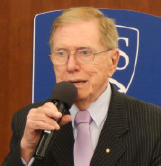 Speaking at the launch event, Kirby commended the Report’s authenticity: ‘This is not a document prepared by Occidentals, or even by an international organisation of people of different cultural backgrounds. This is a document prepared on the Korean Peninsula by the KBA, which is established in the Republic of South Korea, and by a group of Korean lawyers who have gathered together their perspective, a Korean perspective, on human rights in North Korea.’
Speaking at the launch event, Kirby commended the Report’s authenticity: ‘This is not a document prepared by Occidentals, or even by an international organisation of people of different cultural backgrounds. This is a document prepared on the Korean Peninsula by the KBA, which is established in the Republic of South Korea, and by a group of Korean lawyers who have gathered together their perspective, a Korean perspective, on human rights in North Korea.’
The launch took place on 27 October 2015, during a conference organised by the IBA North America office that brought together representatives from leading NGOs and academic institutions. Entitled US policy toward North Korea: the case for instituting a more effective, human rights-centric approach, the conference’s goal was to provide decision-makers on Capitol Hill and in the Obama Administration, as well as the media, academics and NGOs, with the best available thinking on the value of a more human rights related US policy on North Korea.
The report can be downloaded, and film of Michael Kirby viewed, at tinyurl.com/NorthKoreaReport
The IBAHRI at the Annual Conference
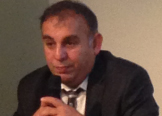 With human rights a hot topic at this year’s Annual Conference, the sessions led by the IBAHRI were particularly timely. Human Rights in Europe featured speakers from the UNHCR and ILGA to discuss sexual orientation and gender identity in Europe as well as the continuing refugee crisis.
With human rights a hot topic at this year’s Annual Conference, the sessions led by the IBAHRI were particularly timely. Human Rights in Europe featured speakers from the UNHCR and ILGA to discuss sexual orientation and gender identity in Europe as well as the continuing refugee crisis.
The showcase session, The UN Security Council and human rights, saw special guest Kofi Annan illuminate the debate that often centres around the politicised use of the veto by the UN’s permanent members. Annan also spoke at another human rights-related showcase session during the Annual Conference. He discussed the UN Guiding Principles on Business and Human Rights and the positive role that lawyers can play in their implementation with former UN Special Representative on Business and Human Rights, John Ruggie.
The final IBAHRI session, The independence of the legal profession in Europe, brought leading lawyers from across the continent to discuss the different ways in which their professional independence is restricted in their home jurisdictions. During the session Khalid Bagirov provided a harrowing account of the situation in Azerbaijan.
View film coverage of IBAHRI sessions in Vienna at tinyurl.com/ViennaCoverage
Refugee crisis: Middle East must share ‘burden’ says former EC President Barroso
Ruth Green
Middle Eastern countries must share the responsibility of the Syrian refugee crisis, says former European Commission President José Manuel Barroso.
‘I believe that it will take some time, but Europe will find a solution to this problem. It will need the help of the global community, not only the countries of the region – some of them are already making a huge effort, from Jordan and Lebanon to Turkey – but also other countries where the majority of the populations are Muslim, and they have the means to do more,’ he told a packed auditorium during his keynote speech at the IBA Annual Conference in Vienna.
Although Barroso said the word ‘crisis’ had fast become synonymous with Europe – whether in economic or geopolitical terms – he said the influx of refugees into the continent highlighted that Europe is bearing the brunt of conflicts playing out in the Middle East.
‘Let me put things into perspective. Europe is facing a problem, but the real crisis is in the Middle East, north of Africa, that’s where the crisis is and people come to Europe precisely because they want to live in peace and if possible give to their children some prosperity.’
Miguel Moratinos, former EU Special Representative for the Middle East Peace Process and a former Spanish Minister of Foreign Affairs, told Global Insight that while Arab states could do more to alleviate the crisis, ultimately their responsibility should be to end the Syrian conflict.
‘Of course everybody has a responsibility [to take] refugees, but [the greater] responsibility of the Arab states is to put an end to the Syrian war,’ he says.
‘They will tell you that in Kuwait and the United Arab Emirates there are already 200,000 Syrians. And they will say that they have given the UN High Commission of Refugees I don’t know how many millions of euros, that were used to finance the refugee camp in Turkey. [But] for me it’s not really a question of whether they’re ready to take some refugees or not, it’s that we have to put an end to the Syrian war.’
Speaking to Global Insight, Barroso said European countries were on the right path, but transnational or supra-national cooperation would be necessary to help them manage the crisis effectively.
“ Let me put things into perspective. Europe is facing a problem, but the real crisis is in the Middle East
José Manuel Barroso
Former President of the European Commission
‘Now the most urgent thing is the refugees. And I think basically the European institutions are doing the right thing,’ he said. ‘They are trying to have some burden-sharing, because those refugees cannot stay in the countries where they arrive, because simply there is not the capacity for Greece or even Italy – which is much bigger and much richer – but it’s not possible to have all these refugees there.’
Barbara Wegelin, a senior associate at Everaert Advocaten Immigration Lawyers, who chaired a roundtable on immigration and the refugee crisis at the Annual Conference, agrees
that a collective response from Europe is vital.
‘It is impossible for only one or several EU Member States to handle this crisis and provide appropriate reception facilities for those people seeking protection as well as processing their claims,’ she says. ‘The problem is simply too large and too many-faceted to be dealt with by single or few Member States.’
Despite security concerns prompted by the migrant crisis, Anders Fogh Rasmussen, former Secretary-General of NATO and former Prime Minister of Denmark, told Global Insight during the conference that Europe’s migration issues did not necessitate a collective response from NATO.
‘The refugee pressure has nothing to do with collective defence,’ he says. ‘The influx of refugees into Europe is not a NATO business. That’s for the European Union to address.’
However, the attacks on Paris have called into question security measures across Europe. As countries remain on high security alert, Karl Waheed, Secretary of the IBA Immigration and Nationality Law Committee and founder of Karl Waheed Avocats in Paris, told Global Insight that France’s reinforced anti-terrorism measures after the Paris attacks follow in the footsteps of the USA Patriot Act introduced by the US government in the wake of 9/11.
‘We don’t have any political debate anymore,’ he says. ‘The kind of Patriot Act that we’ve passed, which is an extension of the État d’Urgence [State of Emergency] that permits the government to suspend all civil rights, has now been extended by three months until the end of February 2016.
‘The general opinion is – just like the Patriot Act – that we want this and even defenders of civil liberties agree that we have to give up some civil liberties temporarily for the government to make our world safe.’
Watch interviews with José Manuel Barroso and Miguel Moratinos online, part of the IBA’s Vienna film content, at www.ibanet.org/Conferences/vienna_films
Transcripts of interviews with Anders Fogh Rasmussen can be found in this edition of Global Insight.
IBA Human Rights Award 2015 - Intigam Aliyev honoured for defence of human rights in Azerbaijan
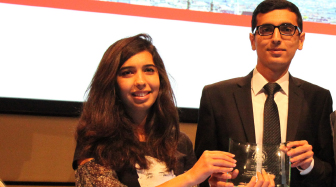 Intigam Aliyev has been named as the winner of this year’s IBA Human Rights Award in recognition of his work defending human rights and the rule of law in Azerbaijan. Aliyev’s son and daughter travelled to the IBA Annual Conference in Vienna to receive the award on their father’s behalf, as he is currently serving a seven-and-a-half year prison term.
Intigam Aliyev has been named as the winner of this year’s IBA Human Rights Award in recognition of his work defending human rights and the rule of law in Azerbaijan. Aliyev’s son and daughter travelled to the IBA Annual Conference in Vienna to receive the award on their father’s behalf, as he is currently serving a seven-and-a-half year prison term.
Sentenced to imprisonment in April 2015, Intigam Aliyev’s arrest is one of many in the ongoing crackdown on human rights defenders in Azerbaijan. As President of the Legal Education Society and member of the Council of Europe’s Expert Council on NGO law, Aliyev presented more than 100 cases of alleged human rights breaches to the European Court of Human Rights. He has also provided ongoing support to NGOs, civil society organisations and other marginalised groups who were politically persecuted. His arrest, extended pre-trial detention and final trial did not adhere to international fair trial standards, and were considered to be politically motivated by many, including the IBAHRI.
In the acceptance speech read out by his son Necmin Kamilsoy, Aliyev dedicated his award to all defenders of human rights in Azerbaijan:
‘Today, in my country, my friends, colleagues, conscientious people, are facing prosecutions, pressures and imprisonments. They deserve this award at least as much as I do.’
The IBAHRI, continues to call for an urgent review of Intigam Aliyev’s sentencing.
IBAHRI urges Australia to reconsider refugee relocation policy
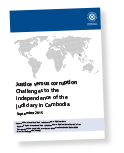 Australia’s refugee policies have tainted the country’s human rights record for years. The recent establishment of offshore refugee detention centres in Manus and Nauru Islands led to an outcry by the international community who condemned Australia’s policy.
Australia’s refugee policies have tainted the country’s human rights record for years. The recent establishment of offshore refugee detention centres in Manus and Nauru Islands led to an outcry by the international community who condemned Australia’s policy.
In a recent open letter, the IBAHRI has expressed deep concern about the discovery that Australian immigration officials have been making a series of false claims about what it is like to live in Cambodia. In a bid to persuade refugees to relocate, false information about Cambodia’s socio-political circumstances have been used to encourage detainees to move to a country that commits grave human rights violations.
As part of a Memorandum of Understanding between the two countries, Australia is attempting to send refugees seeking asylum within its borders to Cambodia, without having made significant provisions for their safety and wellbeing. Claims made in government fact-sheets, circulated in the refugee detention centres, say that Cambodia is a safe country, where the rule of law is maintained and good quality health care is provided, among other benefits.
‘Cambodia suffers from serious human rights abuses, is not truly democratic and has serious problems with poverty, law enforcement and implementation of the rule of law in general,’ reads the open letter refuting Australia’s claims. ‘We urge you to discontinue disseminating inaccurate information about Cambodia to refugees and reconsider this relocation policy altogether.’
The open letter, addressed directly to the Australian Prime Minister Malcolm Turnbull, is signed by the IBAHRI Co-Chairs, Helena Kennedy QC and Hans Corell, and IBAHRI Director Phillip Tahmindjis.
The IBAHRI draws particular attention to findings presented in the report Justice versus corruption: Challenges to the independence of the judiciary in Cambodia, released in September 2015. Following a fact-finding mission to Cambodia, in response to a series of regressive laws passed in 2014, the final report argues that, with the executive now holding excessive power over the judiciary, and corruption having been found to be rampant, Cambodia faces huge challenges in upholding the rule of law, and as a consequence international human rights standards. In light of this, Australia is urged to reconsider its own regressive policies relating to its treatment of refugees.
To read the IBAHRI’s recent report on Cambodia, Justice versus corruption, visit tinyurl.com/o9yz2tu
IBAHRI continues work to help tackle Mexico’s torture problem

A country facing myriad challenges and widespread violence: the UN Special Rapporteur on Torture, Juan Méndez, concluded earlier this year that ‘torture in Mexico is generalised’. Since 2006, the IBAHRI has had an ongoing torture prevention capacity-building programme in Mexico, which recently delivered a series of torture prevention training sessions, at a crucial time for the Mexican criminal justice system.
As part of the first stage of the programme in September 2015, over 200 participants attended two-day training sessions in Mexico City, Estado de Mexico, Tamaulipas and Oaxaca states. Conducted by the IBAHRI in partnership with national justice institutions, the Office of the High Commissioner for Human Rights (OHCHR) and other UN experts, the sessions were delivered to a range of Mexican judges, prosecutors and public defenders. Expert trainers included President of the UN Human Rights Committee, Professor Fabian Salvioli (Argentina) and member of the UN Human Rights Committee, Professor Victor Rodriguez (Costa Rica).
In conjunction with the OHCHR and Mexican institutions, IBAHRI is currently co-producing publications on torture, enforced disappearances and reparations, with a focus on gender issues. The publications will be launched over the course of the ongoing programme and follows on from the 2013 release of Protecting People from Torture in Mexico: A Guide for Legal Professionals.
The next round of training sessions is due to take place in February 2016.
Latest IBA podcast focuses on climate justice
Climate change is having a disproportionate effect on the poorest people, who are not responsible for its causes. Some countries, such as the Maldives, may not exist in years to come, leaving its people to face important questions of territory, sovereignty and migration. It is imperative that talks in Paris rise above the negotiators' narrow focus to reach an agreement that addresses the injustice of climate change.
To coincide with the COP21 climate talks taking place in Paris, a new IBA podcast featuring climate justice. In the podcast United Nations Special Envoy on Climate Change, Mary Robinson, former US Vice-President, Al Gore, and former President of the Maldives, Mohamed Nasheed, outline what climate justice means to them and their hopes for the Paris talks.
The podcast is based on a range of interviews which can be viewed in full on the IBA website. To download the podcast visit tinyurl.com/IBAPodcasts.
São Paulo conference continues IBA events commemorating the Magna Carta
The second of three IBA conferences devoted to the 800th anniversary of the Magna Carta took place in São Paulo, on 12–13 November. The conference was very well attended with some high-profile Latin American speakers including a former President of Bolivia, Carlos Mesa.
Topics discussed by delegates included the relevance of the principles of Magna Carta and other charters (such as the Oath of Aragon) to Latin America today; and the Magna Carta’s importance for the birth of freedom institutions.
At the first IBA Magna Carta conference in Cape Town in May, delegates discussed the role of lawyers in upholding democracy and upholding the rights of individuals. Magna Carta, like modern national constitutions and international treaties, pledged that no one would be denied ‘right or justice’. What was true in 1215 remains true today: the worthy goal of providing justice to all is dependent on lawyers who are willing to hold the state to its word. Lawyers play a key role in ensuring that the rule of law is upheld and that the rights and freedoms guaranteed on paper are enforced in practice.
A final conference in New Delhi on 5 December completes this series of special one-day conferences.
For films of the Cape Town Magna Carta conference, see tinyurl.com/IBAMagnaCartaCapeTown
UN High Commissioner Zeid accepts human rights award and calls for solidarity in the face of ISIS attacks and climate change
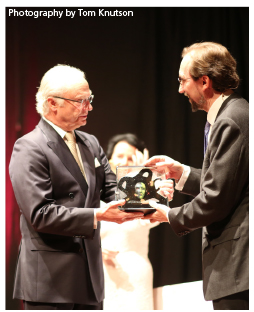 Nations must work together and reassert their ‘commitment to human rights’, not only in the face of attacks by ISIS, but also to arrest climate change, according to the UN High Commissioner for Human Rights, Prince Zeid Ra’ad Al-Hussein of Jordan.
Nations must work together and reassert their ‘commitment to human rights’, not only in the face of attacks by ISIS, but also to arrest climate change, according to the UN High Commissioner for Human Rights, Prince Zeid Ra’ad Al-Hussein of Jordan.
Prince Zeid made the remarks during an awards ceremony held in Sweden’s Berwaldhallen concert hall on 24 November where he accepted the 2015 Stockholm Human Rights Award.
Prince Zeid, who was appointed UN High Commissioner in 2014, was presented the award by His Majesty the King of Sweden, Carl XVI Gustaf, in recognition of his tireless work to advance international justice and strengthen respect for human rights.
‘We are facing mounting inhumanity in the world,’ he told the packed concert hall, which included Her Majesty Queen Silvia of Sweden and IBA President David W Rivkin.
‘More and more states are violating the international laws that they themselves agreed. There is shocking needless suffering that could have been prevented. This is the oldest challenge of humanity, to learn to live and work together. You can count on us at the UN OHCHR to promote the fundamental values of freedom, equality and respect for each other. These values are the practical drivers of harmony and peace. I accept this award on behalf of all my staff at the UN OHCHR.’
Particularly in relation to ISIS – or Daesh as it is sometimes known – Prince Zeid said the group’s actions must not divide the world, but that the international community must work together to ensure human rights are upheld.
‘The greatest threat to humanity at the moment is to think along too narrow bands of thought,’ he said. ‘The thinking of Daesh is razor thin. We cannot think like that. Nations cannot think only of their own issues – we have to work together… Daesh is creating fear, and it has been said before that fear is a very bad adviser. We need a strong reassertion of our commitment to human rights.’
Hailing from Jordan, a country that has taken in more than 650,000 Syrian refugees to date, Prince Zeid called on governments across the world to follow suit. ‘When you have migrants and refugees in a boat on the Mediterranean, or in a truck crossing borders, they suffer together, they drown together. Must we abuse them further? The mean spiritedness of so many governments around the world is breathtaking… We live on a small blue dot. If we don’t work together we are in danger. We need urgency now.’
Commenting on the award, which is presented annually by the Swedish Bar Association, the IBA and the International Legal Assistance Consortium, Dr Mark Ellis, IBA Executive Director, said: ‘Prince Zeid’s compassion and humanity are inspiring. He is truly deserving of this award. His is a passionate and intelligent voice for the best human values to which the world at this time more than ever needs to listen.’
Anne Ramberg, Secretary General of the Swedish Bar Association, described him as ‘an eminent example of someone who has fostered human rights where they are under threat. His long time commitment to human rights helps those who suffer across so many countries.’
Prior to his role as UN High Commissioner, Prince Zeid held a number of important positions at the UN, including president of the Security Council, chairman of the Country-Specific Configuration of the UN Peace Building Commission for Liberia and adviser to the Secretary-General on Sexual Exploitation and Abuse in UN peacekeeping.
During an on-stage question and answer session with Dr Ellis after the ceremony, Prince Zeid highlighted renewed efforts to eradicate instances of sexual abuse among UN peacekeeping soldiers. ‘Only a few days ago we received another dreadful series of allegations about UN peacekeeping troops in the Central African Republic, of sexual abuse of children,’ he said.
‘I have proposed that every serving soldier with the UN give a DNA sample before serving… court martials should be done in situ, where witnesses are available. The UN, and the nations legally responsible for their troops, clearly needs to do so much better.’
Prince Zeid has also played a crucial role in the genesis and establishment of the International Criminal Court in 2002, which has jurisdiction to prosecute individuals for international crimes of genocide, crimes against humanity and war crimes. In 2011 he also notably chaired the search committee tasked with selecting the ICC’s second Chief Prosecutor and oversaw the appointment of Fatou Bensouda in this role.
Although he admitted the ICC faced many challenges ahead, he strongly believes international support for the Court will prevail: ‘When we set up the ICC, we thought that impunity was no longer going to be possible. We were naive. We see countries not cooperating with the court. We see killings of this sort being treated by nations as permissible. But it is inevitable that all countries will support this court in the end.’
See picture gallery from the event